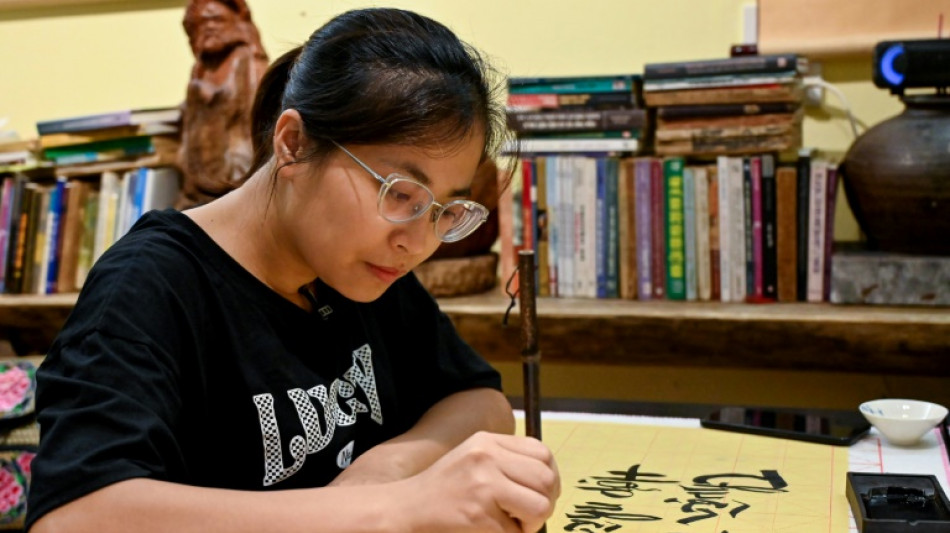
-
 Atletico already playing catch-up after poor La Liga start
Atletico already playing catch-up after poor La Liga start
-
Lyon find cause for optimism after turbulent summer

-
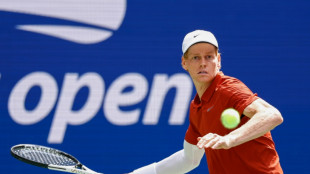 Sinner on the march as tearful Gauff, Swiatek toil at US Open
Sinner on the march as tearful Gauff, Swiatek toil at US Open
-
Julia Roberts to make Venice debut in cancel culture drama

-
 Big numbers set to remain a feature of Women's Rugby World Cup
Big numbers set to remain a feature of Women's Rugby World Cup
-
Families lose hope for Salvadorans held in gang crackdown
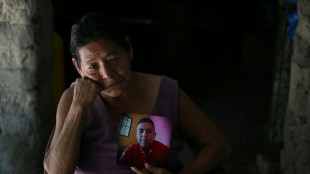
-
 Trump thumbs nose at decades of India courtship
Trump thumbs nose at decades of India courtship
-
Gauff wins crying game to reach US Open third round
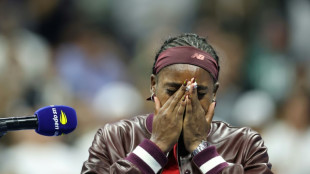
-
 Arsenal seek statement win at Liverpool, Amorim faces Burnley must-win
Arsenal seek statement win at Liverpool, Amorim faces Burnley must-win
-
Cowboys trade Parsons to Packers in blockbuster NFL deal

-
 Russian attack killing 23 in Kyiv unleashes international fury
Russian attack killing 23 in Kyiv unleashes international fury
-
Venezuela revives heroes with AI to spur reservists on US 'threat'

-
 Solskjaer sacked by Besiktas after European flop
Solskjaer sacked by Besiktas after European flop
-
Froome to undergo surgery after breaking back in training crash

-
 Trump moves to end US tariff exemption for small packages
Trump moves to end US tariff exemption for small packages
-
US targets Venezuela over 'Soles' cartel. Does it exist?

-
 Coe hails 'overwhelming support' for gene testing ahead of Tokyo worlds
Coe hails 'overwhelming support' for gene testing ahead of Tokyo worlds
-
Solskjaer fired by Besiktas after Conference League failure, Palace squeeze through

-
 Osaka slams Ostapenko rant in US Open 'racism' storm
Osaka slams Ostapenko rant in US Open 'racism' storm
-
Rubio to visit Mexico, Ecuador next week to discuss migration, China

-
 US church shooter 'obsessed with idea of killing children'
US church shooter 'obsessed with idea of killing children'
-
US stocks reach new peaks as investors digest US GDP

-
 US approves $825 mn missile sale to Ukraine
US approves $825 mn missile sale to Ukraine
-
Rubio to visit Mexico, Ecuador next week to discuss migration, China: US

-
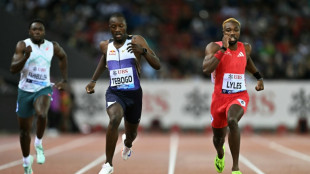 Lyles edges Tebogo in Zurich thriller in perfect Tokyo boost
Lyles edges Tebogo in Zurich thriller in perfect Tokyo boost
-
Lyles trumps Tebogo in Zurich, Alfred shines

-
 Arsenal optimistic about Havertz return after knee surgery
Arsenal optimistic about Havertz return after knee surgery
-
Pressure-free Wong relishing US Open adventure
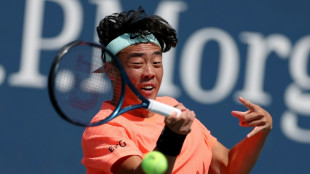
-
 RFK Jr bashes US health agency after its chief is sacked
RFK Jr bashes US health agency after its chief is sacked
-
Swiatek wobbles at US Open as Sinner targets third round

-
 Alfred storms to 100m victory at Diamond League finals
Alfred storms to 100m victory at Diamond League finals
-
Bison herds 'reawaken' Yellowstone's prairies

-
 RFK Jr bashes US health agency after firing its chief
RFK Jr bashes US health agency after firing its chief
-
Swiatek labours into US Open third round

-
 UN sets 2027 exit for Lebanon peacekeepers after Israeli strikes
UN sets 2027 exit for Lebanon peacekeepers after Israeli strikes
-
Brazil police target network that siphoned billions from fuel sector

-
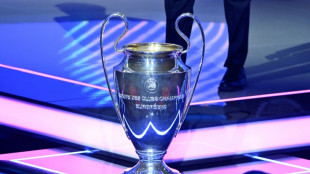 Liverpool and Man City face Real Madrid in Champions League, PSG get tough draw
Liverpool and Man City face Real Madrid in Champions League, PSG get tough draw
-
'Strangest' dinosaur covered in spiked armoury: scientists

-
 UN Security Council votes for Lebanon peacekeepers to leave in 2027
UN Security Council votes for Lebanon peacekeepers to leave in 2027
-
Badminton federation smoothes feathers ruffled by shuttlecock shortage
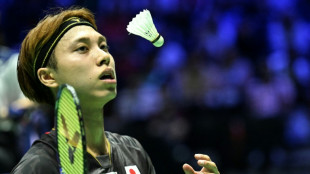
-
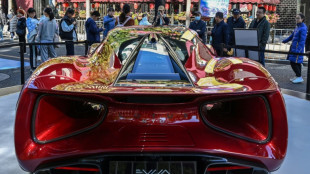 Luxury carmaker Lotus to slash UK jobs amid US tariffs
Luxury carmaker Lotus to slash UK jobs amid US tariffs
-
Small parcels in limbo as Trump moves to end US tariff exemption

-
 Russian attack killing 19 in Kyiv unleashes international fury
Russian attack killing 19 in Kyiv unleashes international fury
-
Europe powers move to reimpose Iran sanctions over nuclear drive

-
 UN chief condemns 'endless' Gaza horrors as Israel presses offensive
UN chief condemns 'endless' Gaza horrors as Israel presses offensive
-
Vine claims solo Vuelta stage six victory, Traen takes lead

-
 Emma Stone stars in apocalyptic satire at Venice Film Festival
Emma Stone stars in apocalyptic satire at Venice Film Festival
-
England skipper Aldcroft to miss rest of Women's Rugby World Cup pool phase

-
 Norris sees others closing gap with dominant McLaren
Norris sees others closing gap with dominant McLaren
-
UK govt seeks to overturn ban on housing migrants in hotel


'It's in our blood': how Vietnam adopted the Latin alphabet
At a calligraphy class in Hanoi, Hoang Thi Thanh Huyen slides her brush across the page to form the letters and tonal marks of Vietnam's unique modern script, in part a legacy of French colonial rule.
The history of romanised Vietnamese, or "Quoc Ngu", links the arrival of the first Christian missionaries, colonisation by the French and the rise to power of the Communist Party.
It is now reflected in the country's "bamboo diplomacy" approach of seeking strength through flexibility, or looking to stay on good terms with the world's major powers.
A month after China's Xi Jinping visited, French President Emmanuel Macron will arrive on Sunday.
Huyen, 35, takes weekly calligraphy classes alongside six others at her teacher's tiny home as "a way to relax after work".
"When I do calligraphy, I feel like I'm talking to my inner self," she told AFP, her head bent in concentration.
- Missionaries, civil servants -
On Monday, Macron is due to visit Hanoi's star attraction, the Temple of Literature, whose walls and explanatory panels are decorated with calligraphy in both traditional Chinese-influenced characters and Quoc Ngu.
Colonisation led to the widespread use of Quoc Ngu -- which uses accents and signs to reflect the consonants, vowels, and tones of Vietnamese -- but it was created two centuries earlier on the initiative of Catholic priests.
When the Avignon-born Jesuit Alexandre de Rhodes published the first Portuguese-Vietnamese-Latin dictionary under his own name in 1651, it was primarily intended for missionaries wishing to spread their religion in what was then called "Dai Viet".
The French then spread the Latin alphabet while training the civil servants who helped them govern Indochina, explained Khanh-Minh Bui, a doctoral student at the University of California, Berkeley, specialising in 19th- and 20th-century Vietnamese history.
Another motive was "severing connections with an older civilisation, which has greatly influenced the elites", in this case China, she said.
- Artistic freedom -
Compared to the characters that had been in use for centuries, Quoc Ngu was far easier to learn.
Its adoption fuelled an explosion in newspapers and publishing which helped spread anti-colonial ideas that ultimately led to the rise of the Communist Party.
"Quoc Ngu carried the promise of a new education, a new way of thinking," said Minh.
When Ho Chi Minh proclaimed independence in 1945, it was "unthinkable" to turn back the clock, she added.
Today, a Western tourist lost in the alleys of Hanoi can read the street names, but would have a hard time pronouncing them correctly without understanding the diacritics used to transcribe the six tones of Vietnamese.
Calligraphy teacher Nguyen Thanh Tung, who has several young students in his class, says he has noticed rising interest in traditional Vietnamese culture.
"I believe that it's in our blood, a gene that flows in every Vietnamese person, to love their traditional culture," he said.
Calligraphy in Quoc Ngu offers more artistic freedom "in terms of colour, shape, idea" than that using characters, he believes.
"Culture is not the property of one country, it's an exchange between regions," added Tung, 38.
"English and French borrow words from other languages, and it's the same for Vietnamese."
H.Jarrar--SF-PST
